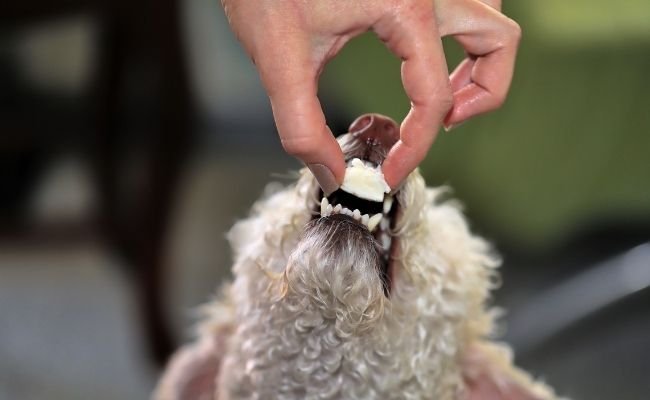Can Poodles Eat Bananas?- Discover Everything You Need To Know
Owning a Poodle comes with lots of responsibilities, and one of these is feeding them. There are several kinds of food out there and some may seem like human food. Bananas are a case in point.
But can Poodles eat bananas?
Poodles can eat bananas, but it’s important to be careful with quantity. Bananas are a healthy alternative for poodle treats, and though not toxic like chocolate or sugar cubes might be, there is still the possibility of gastric problems if too many were given.
Like any other treat, you need to learn how to give your poodle bananas. Below are the steps of feeding your poodle bananas.
Nutritional Value of One Medium Ripe Banana
| calories | 110 |
| Fat | 0 gram |
| Protein | 1 gram |
| Carbohydrate | 28 grams |
| Sugar | 15 grams |
| Fiber | 3 grams |
| Potassium | 450 mg |
Nutritional Benefits Of Bananas
Before you even feed your poodle banana, you need to know first about the nutritional benefits it can give to your poodle.
Bananas are natural sources of potassium, vitamin C, and also fiber. They are also a rich source of vitamin B6, vitamin B3, vitamin B2, magnesium, and manganese. They also contain a lot of glycoproteins which improve digestion and prevents constipation.
This means bananas are great for canines who suffer from heart diseases. It is also good for other vitamins and minerals your pet has a deficiency of, so it’s an overall well-rounded food for them. They are very easy to digest as well, and also inexpensive, making them a perfect treat for your canine.
How to Give Your Poodle a Banana:
If you aren’t sure about how you should give your poodle a banana, you will just need to follow these five simple steps.
Step #1 Pick and Peel the Banana:
Select a banana from the bunch and remove any strings. Remove the banana peel and discard it. Keep in mind that the banana peel can be toxic to your pup so it’s important you don’t give them any of the peel at all.
N/B The banana needs to be ripe enough. Keep in mind that unripe bananas can cause serious stomach problems to your dog when ingested.
Step #2 Slice the Banana:
Cut the banana lengthwise into two halves. Some canines may be OK with eating it whole as well, but I’d recommend that you slice it into smaller portions. You’d be surprised how fast a banana will disappear from the bowl!
Step #3 Break Each Piece Into Smaller Pieces:
Break each half of the banana into three or four pieces. The recommended serving size is no more than three pieces a day so you can break it into smaller ones based on how much the poodle needs to eat every day.
Step #4 Hold The Banana In One Hand:
Some poodles are not comfortable eating food directly from the hand, so using a dog bowl is recommended for these kinds of canines. However, you can still train them to eat it directly from your hand if you like.
Step #5 Feed Your Dog:
Hold the banana piece in your hand and let your poodle smell it. Most likely, they will be curious about the food you’re holding. If they are feeling apprehensive, try using more familiar treats like kibble at first to get them comfortable with being fed directly from your hands.
If your dog has never tasted bananas, you may want to try placing one piece of banana on his mouth and having him lick it off. This way, he’ll develop a taste for the treat and more likely will eat the whole thing if you place it inside his mouth instead of letting him swallow it as a whole.
Dos and Don’ts:
When feeding your poodle a banana, there are some important things you should be mindful about. The list below includes some dos and don’ts for feeding your poodle bananas:
- Begin by consulting your vet about bananas for your poodle. Not all dogs are allergic to bananas but it’s best to check if he has a history of allergies.
- Don’t give your poodle bananas every day. Remember that too much of anything that is given as a treat can still be bad for poodles so don’t overfeed them.
- Never give your poodle a whole banana. Always divide it into smaller pieces if you’re going to give them bananas.
- Don’t add sugar on top of the banana pieces. Although this will make the food tastier, it defeats its purpose as one of the treats for your dog and makes it unhealthy in large quantities.
- Do make sure that you only give ripe bananas. Unripe bananas can cause serious stomach problems for your dog when consumed. Hence, it’s best to cut it lengthwise and let your dog eat the banana when ripe.
- Don’t let your pup chew on the banana peel. The peel can be toxic to dogs, so it’s important that you discard the skin and eliminate any traces of it from your poodle’s mouth when eating bananas.
- Do consider taking out the seeds if they are present. Some poodles might find them hard to swallow and digest, which is why it’s best to remove them from the pieces.
- If you’re not sure if your poodle has allergies or an upset stomach, have him/her checked up at the vet’s office so they can help you out. Remember that bananas are not toxic but some dogs may still vomit a lot even after eating just three pieces of it in a day. A veterinarian should know what to do for your dog.
Side Effects Of Feeding Your Poodle A Banana:
Although bananas are typically safe for poodles, eating too much of them can still be dangerous. The following are the side effects that can come along with improper banana feeding:
- Diarrhea
- Vomiting
- Lethargy/Sleepiness
- Diabetes
- Allergic Reactions
- Obesity
- Weight changes
Final Verdict:
Bananas are very good for poodles, especially those who have heart problems. If your furbaby has a heart condition, you can give him/her bananas once in a while to help with the symptoms.
However, it’s best not to feed them bananas every day as this may cause them to develop an upset stomach based on how sensitive they are. If you’re not sure how much bananas to give your furry friend, consult a vet first.







